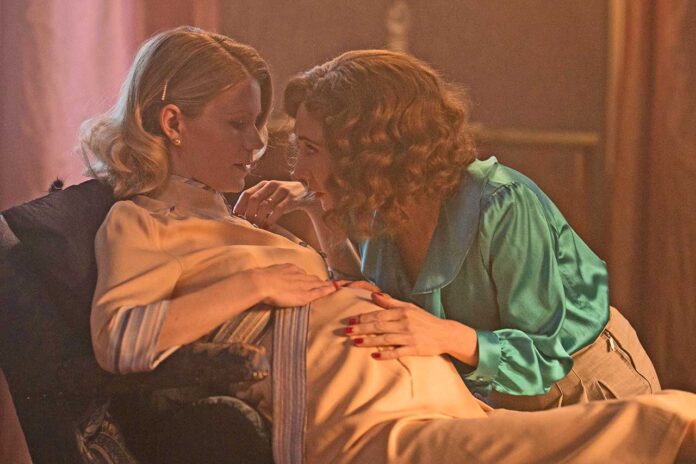“The Affair,” out March 5 on VOD, is a stilted adaptation of Simon Mawer’s novel, “The Glass Room.” It depicts the lives and relationship between two friends, Liesel (Hanna Alström) and Hana (Carice van Houten) starting in 1930s Czechoslovakia.
As the film opens, Liesel is marrying Viktor (Claes Bang). There are gorgeous people, stylish costumes, and a fancy car that lends a classy air to the proceedings, but director Julius Sevcik edits these scenes in such a way that the narrative is more impressionistic than dramatic. Before long, Liesel and Viktor meet the architect Von Abt (Karel Roden playing Ludwig Mies van der Rohe) who will build a house for them. It is an extravagant masterpiece, with rooms of glass and a wall of onyx stone which glows red when the sun hits it.
It is a glorious, happy time for Liesel, but Hana is troubled. When she soulfully admits that she cannot have children, Liesel is sympathetic. The affection between these two women during this tender moment is profound, but “The Affair” downplays it. Instead, the film’s first act concentrates on Viktor’s infatuation with Kata (Alexandra Borbély), a governess who comes to care for the couple’s children. When Liesel discovers her husband’s affair, Hana comforts her. Alas, the vulnerable Liesel jerks her hand away from touching Hana’s breast, she breaks her would-be lover’s necklace. The beads bounce along the floor in a portentous moment of heavy-handed, slow-motion obviousness.
“The Affair” keeps the women apart for most of the rest of the film. That narrative strategy should build desire for the characters to reunite and consummate their love, but Sevcik fails to get viewers deeply invested in their lives. It is more clumsy than touching when Liesel acknowledges that she is thinking of Hana as the film crosscuts Hana rutting with Stahl (Roland Møller), a Gestapo officer, while Viktor and Liesel have perfunctory sex.
The narrative shifts away from Liesel once the Nazis come to power (both women are married to Jewish men). Viktor and Liesel leave for Switzerland, while Hana stays in Czechoslovakia. “The Affair” focuses on Hana’s efforts to protect her husband Oskar (Martin Hofmann) by having trysts with Stahl, who is occupying the house that Von Abt built. The relationship between Hana and Stahl illustrates the desperation of Hana and the power of Stahl, while the house is symbolically transformed from elegant abode to a Nazi-occupied space. As the house decays further over time, becoming a black market warehouse under Soviet occupation, viewers will care more about the glass room where most of the action unfolds than the cardboard characters that inhabit it.
Sevcik’s film may be handsomely mounted, but it is a flavorless dish of Europudding. The lead actresses are Swedish and Dutch, while Claes Bang is Danish, and the supporting cast a mix of Czech actors and actresses. Yet everyone speaks English, albeit with a foreign accent. That may be designed to garner a wide audience, but “The Affair” is too muddled to have mass appeal.
Van Houten is given the unenviable burden of carrying the film, because she is, by default, the most developed character. However, Hana does not engender much emotion. Her character is often enigmatic, and her passions or hardships fail to have any impact. Van Houten is stranded by a screenplay that makes Hana mostly passive, even in her most compelling moment — when she is summoned by Soviet authorities regarding the love letters she has been sending to Liesel.
In contrast, Hanna Alström captures the fragility of her character well, but she is off screen for too long. Viewers will likely want more of her and more scenes of Liesel and Hana together. When the women do eventually reconnect, there is still a spark, but Sevcik inexplicably edits their reunion — further delaying their delayed gratification. The film twice cut from the women to Liesel’s adult son Martin (Vladímir Polívka) in a nightclub, a scene that serves no real purpose. It may be that “The Affair” has been edited down from a longer version, because there are several head-scratching moments like this.
There are also some unintentionally funny episodes. A sequence where Liesel is reading a letter Hana wrote her prompts Viktor to rip it out of his wife’s hand in melodramatic fashion when she mentions Kata. This is risible and leads not to Viktor discovering his wife’s inclinations towards Hana, but to Viktor crying while watching home movies he shot back in Czechoslovakia. Claes Bang has only a handful of scenes in the film, and they are all pretty awful. An episode Viktor has on the tarmac as he and Liesel leave for Switzerland may be the film’s nadir.
Most of “The Affair” is dreadful. But it looks glossy and the house is fabulous. The actors are also very good looking, but their attractiveness cannot compensate for such a bland and enervating historical drama.
